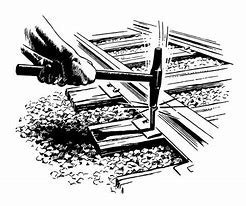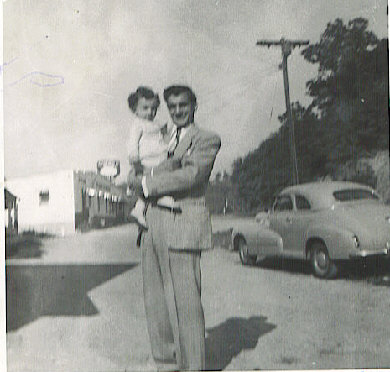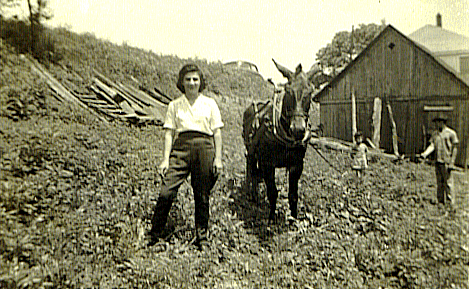| An Immigrant's Life |
| |
| |
| |
My
grandfather, Battista Lacaria, arrived in America as a 16-year-old
during the early 1900s, never to see his parents again. Settling in
Berryburg, West Virginia, he found work on the railroads, where he
carried railroad spikes and observed the social scene among his
fellow workers.
On Fridays and Saturdays, he would watch
them drink, gamble, and squander their weekly wages, experiences
that profoundly shaped his views on life. These formative moments
laid the groundwork for his philosophy, instilling in him a
cautionary perspective on the pitfalls of vice and the importance of
hard work. |
|
 |
|
| |
| | Farms, Mines, Homes & Coffee Cups |
| |
| |
| |
Around 1929,
Battista Lacaria relocated from Berryburg, West Virginia, to acquire
approximately 15 acres of land that would eventually be annexed into
Bridgeport. He worked the area deep mine and farmed the land while
also building a home for his in-laws.
Battista later helped
his two older sons establish their own homes on the property. As a
notable addition to the community, he constructed a building for his
Coffee Cup Restaurant, which now operates as a Mexican restaurant,
marking a significant evolution in the area's culinary landscape.
|
|
 |
|
| |
|
| Epilepsy |
| |
| |
| |
Battista's youngest child, Buddy, suffered a fall off the back of his
tricycle that resulted in a head injury, leading to epilepsy despite
being saved by a doctor. In the wake of this challenge, Battista
converted to Protestantism, attending services on Sunday mornings,
evenings, and Wednesdays.
His father-in-law, Frank Yocco, would
walk about four miles from Bridgeport to Clarksburg, tending to the coal
stove for Sunday services. As a community effort, Battista and other
Italian Catholics went on to establish a non-denominational church,
Christian Assembly, which eventually led to the formation of Faith
Fellowship and subsequent churches, each growing in success and
influence within their community. |
|  |
| |
| | | Battista's Concerns |
| |
| |
| |
| In his later years,
Battista was increasingly concerned about the future care of his son
Buddy, who, despite his epilepsy, demonstrated remarkable
intelligence and analytical skills that marked him as a
high-functioning, undiagnosed savant. Buddy was particularly
passionate about baseball statistics, Christian subjects, and
electronics, often dedicating his time to salvaging and repairing
televisions discarded from a local Zenith store. His love for radios
and circuit boards further highlighted his exceptional abilities. |
|
 |
| |
|
|
| "Rain Man" |
|
|
| |
|
|
|
A cherished memory involves a trip to a local Bridgeport coffee shop
owned by a cousin in our 1973 Cadillac convertible, where Buddy,
filled with joy, ordered his favorite drink—Sprite. However, after
20 minutes, he looked at his watch to remind me that it was time to
leave, as he had a TV show to watch, displaying a behavior
reminiscent of the character Raymond Babbitt from "Rain Man." |
|
 |
|
| |
| | Chair, Bible & White Hat | | |
| | | |
|
My upbringing was enriched by the contrasting
influences of attending Catholic Parochial Schools and also learning
of Protestantism under the guidance of my devout grandfather
Battista, which allowed me to absorb and understand the differences
and criticisms between the two faiths.
I would also sit beside Battista in his garden, where he'd have his
Bible and a vented hat by his side as he shared his thoughts. He
emphasized the importance of helping others without being noticed, a
lesson that deeply resonated as my father always stated the same
along with keeping my achievements to myself.
| |
 |
|
Time Jump - Not Being Noticed |
|
|
|
|
|
|
|
At 34, I began a series of four years of company
trips to esteemed educational institutions in the Northeast and
Canada, often accompanied by my wife, where I eagerly explored
innovative ideas and methodologies. These journeys enabled me to
collect valuable insights to bring back to Bell/Verizon, the FBI,
and West Virginia, aimed at improving our state's technological
landscape while remaining discreet. This period became crucial in my
journey, as I embraced knowledge that could facilitate swift and
meaningful change without the need for personal acknowledgment. |
|
 |
|
|
|
| |
Concerns |
| |
| |
| |
In strict confidence, an attorney prioritized my grandfather Battista's concerns
for his son Buddy by establishing a Trust within my
grandfather's Will, ensuring that Buddy’s needs were met while
placing my father in charge of managing the estate. This arrangement
stipulated that, upon Buddy's passing, the remainder of his estate
would be distributed to his other children.
To safeguard
this plan, the attorney also directed new documents to remain
unrecorded until after my grandfather's death, effectively
concealing the provisions from public view and thereby ensuring
Buddy's protection. This careful planning resembled a "Rain Man"
scenario, where a professional assisted my grandfather in securing a
future for his most vulnerable son long after he was gone. My
grandfather Battista passed away in the 1970's where the plans for
Buddy's care worked flawlessly. |
|
 |
| |
| |
| Buddy 2.0
Plans |
| |
| |
| |
| Proximate 2012: My
ancestral family had a deep-rooted practice of subtly conveying
responsibilities, especially regarding Buddy’s care where my father
and his father before him were focused on ensuring that legal
matters were handled meticulously. His frustration with a new
attorney’s document errors demonstrates the seriousness with which
he treated these issues. |
|
 |
| |
| |
| Absolute
Exactness |
| |
| |
| |
|
My father took a son with him to the attorney for
corrections. My father's
determination for precision in legal matters and the respect he garnered from the "error prone" attorney
underscores the significance my father placed on maintaining the
accurate documentation, and how, despite the frustrations
encountered, the successful corrections provided him a moment of
satisfaction, reinforcing his commitment to ensuring everything is
in line with his intentions, at least for a time. |
|
 |
| |
| |
| The Kiss Of Death |
| |
| |
| |
Buddy's journey after his 2013 diagnosis serves as a poignant reminder
of the complexities involved in medical care, especially in nursing
facilities. Initially, the specialized diet he required aimed to protect
his health, and his apparent progress was a heartening sign of
improvement. However, the decision to place him back on regular
food—despite his dysphasia diagnosis—resulting in tragic consequences
highlights serious lapses in communication and adherence to medical
protocols.
The subsequent frustration of his physician
underscores the accountability challenges in healthcare settings,
especially when the Nursing Home is sold later later on, leaving
questions unanswered as we had to face the profound loss of a loved one.
As we had to do year earlier in 1987 in regard to
Another Family
Member. |
|
 |
|
| |
|
Next:
Afterwards
| |
|
|
|

